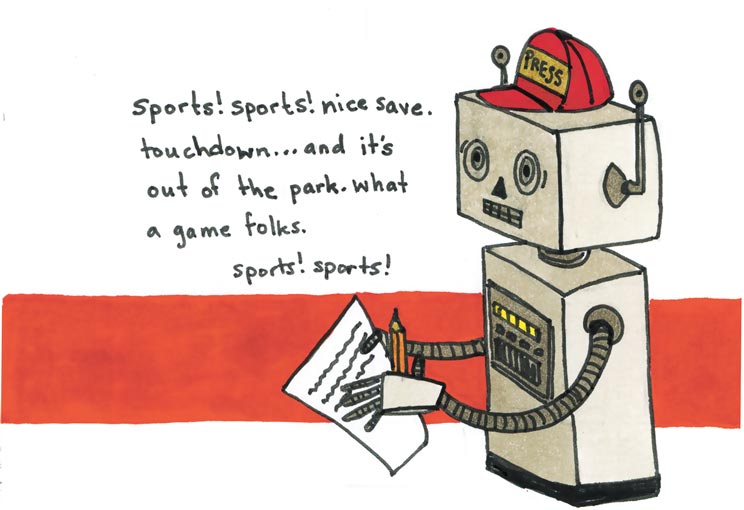
The computers are taking over
By Ashton Chugh, April 9 2015 —
Technology has been integral to the capitalists’ costs-cutting directive and gained widespread notoriety during the industrial revolution. However, computerization is not just relevant to manufacturing — it has breached the world of sports journalism.
At the beginning of 2015, the Associated Press — one of the world’s most influential news services — announced that they will use Wordsmith technology to write recaps of college games they’re unable to send reporters to.
The technology uses a computer algorithm to analyze a game’s box score, then pumps out a generic recap full of cliches, stats and quotes pulled from digitally transcribed post-game interviews. All this is done instantaneously and for a fraction of the cost following the final buzzer.
Concerns of technology causing unemployment is hardly new. In 1589, Queen Elizabeth I denied a patent to William Lee over concerns that his new sewing machine would reduce her subjects to beggars.
Here at home, Jefferson Hagen, the sports editor at the Calgary Herald, thinks the idea of a computer telling an accurate story of mankind’s endeavours is inconceivable.
“While it’s interesting that this technology exists, the concept that a computer could replace a human sportswriter is a slight to the craft,” Hagen said. “There is no substitute for a good sportswriter’s eyes, ears and words.”
Hagen goes on to say that quality game recaps focus on analysis of the players, not simply restating what they did.
“Also, what this doesn’t take into account is that the traditional ‘nuts-and-bolts’ game story has changed significantly in the last decade,” Hagen said. “It’s no longer about the mundane game details and more about an issue, trend or player that emerged during the contest.”
Here at the University of Calgary, Ben Matchett, who heads the Dinos communication staff, says that there is a story beyond the boxscore that can never replace a human’s perspective.
“Soccer is a perfect example,” Matchett said. “It could be a nil-nil game and each team took corner kicks but one team had territorial domination for the entire second half, and had three really close chances that just missed the net. The software is not going to know any of this from a boxscore.”
Matchett also says that an impartial computer could not fully grasp the importance of a game’s narrative, which is often catered to a specific segment of the population.
“The story written by a Calgary Flames beat reporter that appears in the Calgary Herald is always going to have a slant towards them if they wish to maintain their readership,” Matchett said.
Journalism isn’t a high-paying profession, and declining print revenues mean that media conglomerates aren’t lining up to pay the noble sportswriter who covers neglected university sports, while expensing pitchers of beer to the company credit card.
Regardless, those who wish tell the story of mankind’s’ physical achievements have a new competitor in the field. Despite speculation surrounding the merits of Wordsmith technology, sports journalism may be the next profession to be put on the chopping block.
